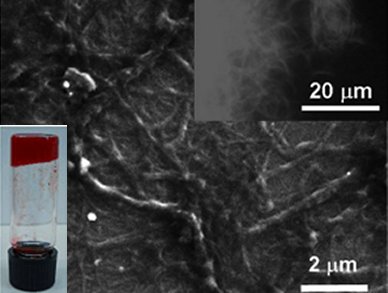A benefit of forming extended fibrous aggregates composed of functional π-conjugated molecules is the generation of gel-like solvent-containing soft materials that improve solution processability in the fabrication of optoelectronic devices. However, the formation of such extended aggregates in chlorinated solvents, which are commonly used for the fabrication of electronic devices because they are good solvents for π-conjugated systems, requires specific design to impart potent one-dimensional aggregation capability to the molecules.
By using perylene bisimide (PBI) dye as a π-conjugated unit, Shiki Yagai, Chiba University, Japan, and co-workers designed and prepared a PBI-bifunctionalized flexible bisurea that can form elongated fibrous aggregates in carbon tetrachloride, 1,1,2,2-tetrachloroethane, and even in chloroform to give viscous solutions or gels.
The group showed that the viscous solutions can be used for the preparation of thin films for field-effect transistor devices. They believe that the application of similar molecular design would enable the development of various π-conjugated systems that can aggregate into gel-forming nanofibers in chlorinated solvents.
- A Perylene Bisimide Organogelator for Chlorinated Solvents,
Xu Lin, Misaki Hirono, Hiroki Kurata, Tomohiro Seki, Yukihiro Maruya, Ken-ichi Nakayama, Shiki Yagai,
Asian J. Org. Chem. 2014.
DOI: 10.1002/ajoc.201300252




